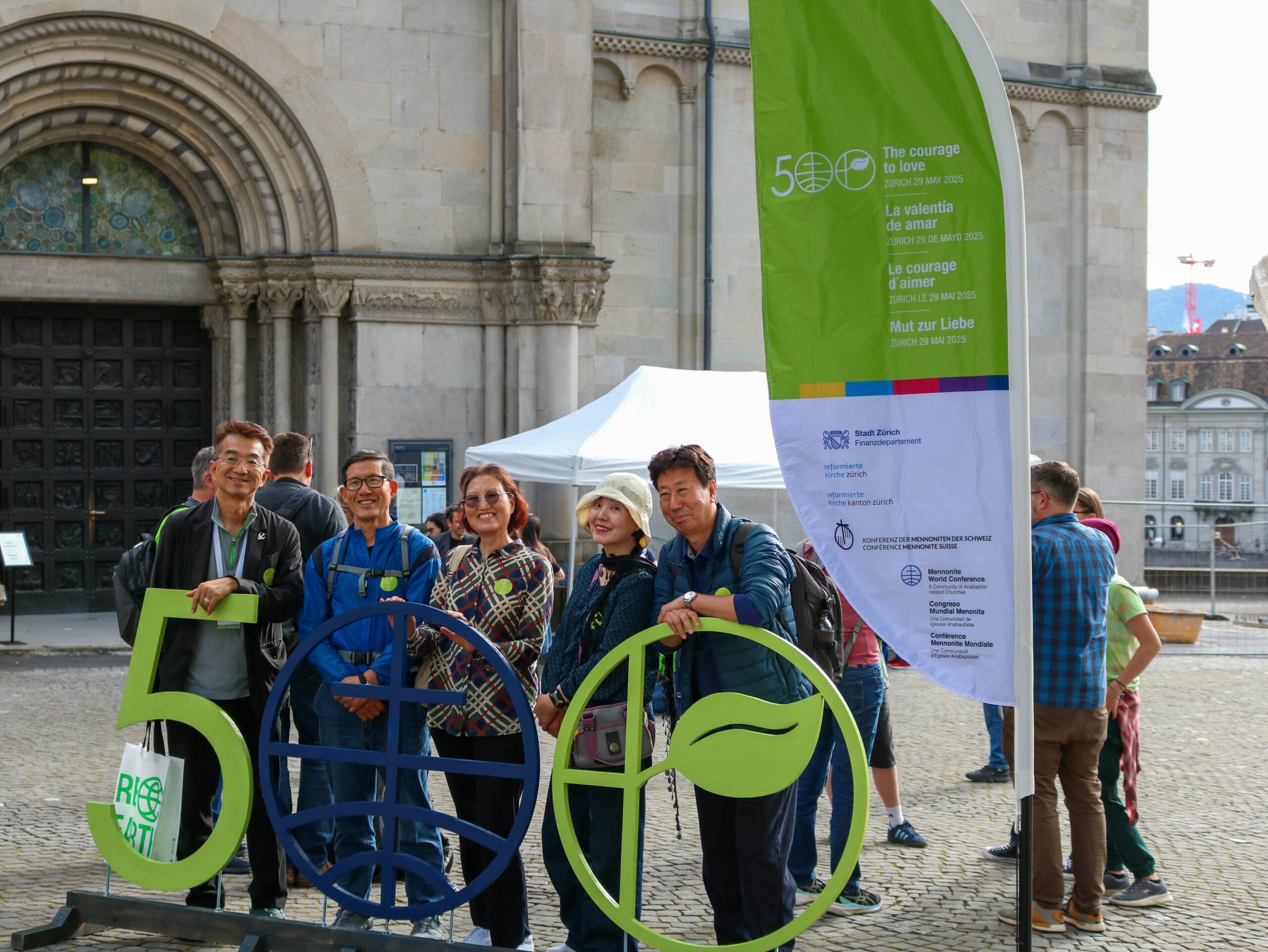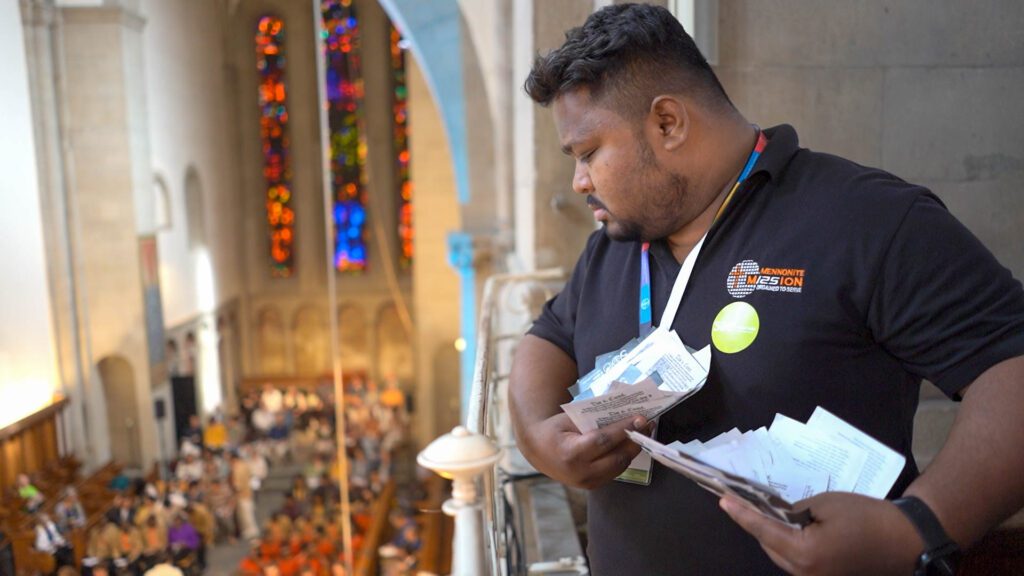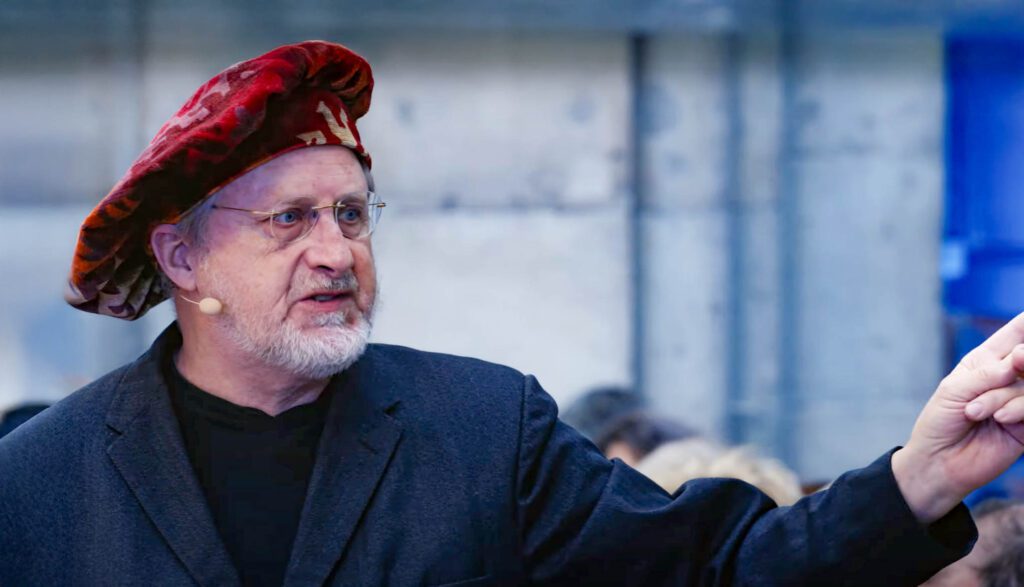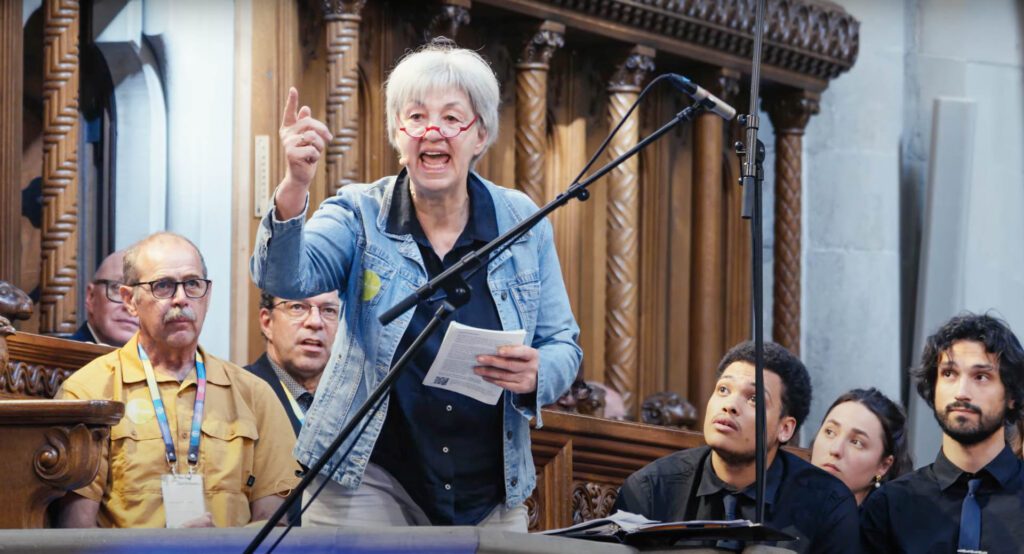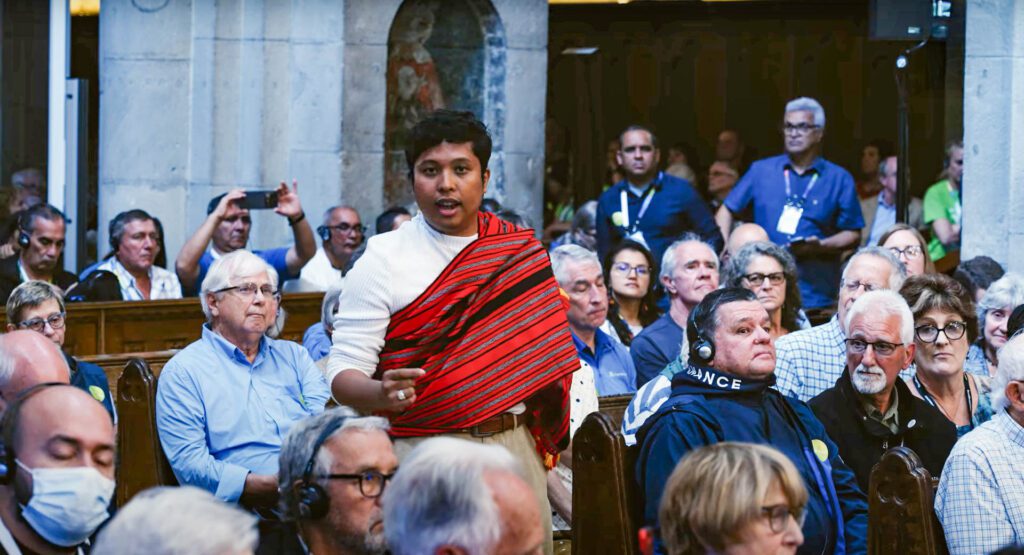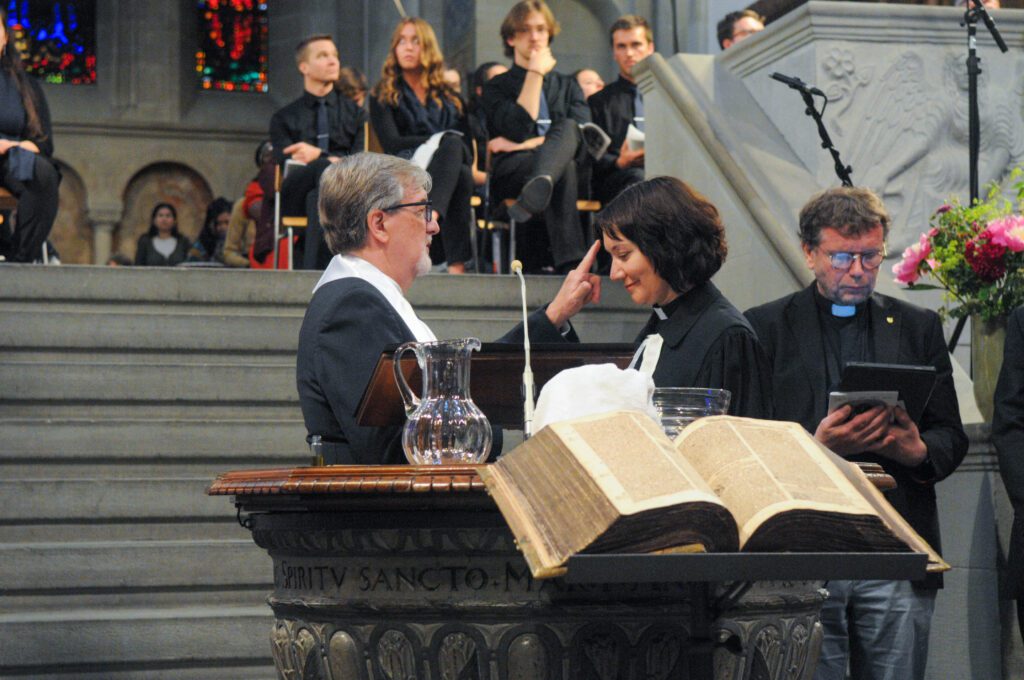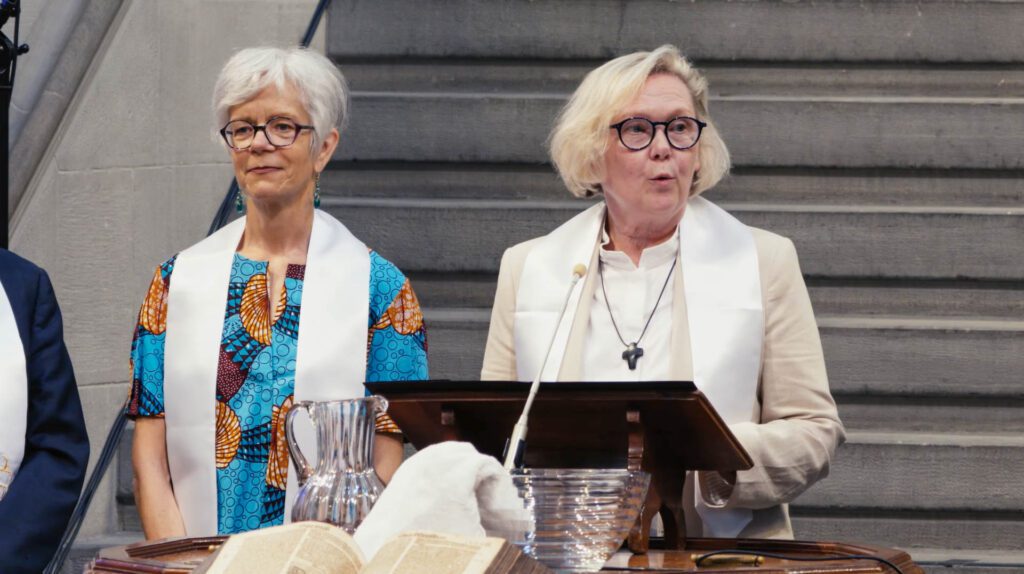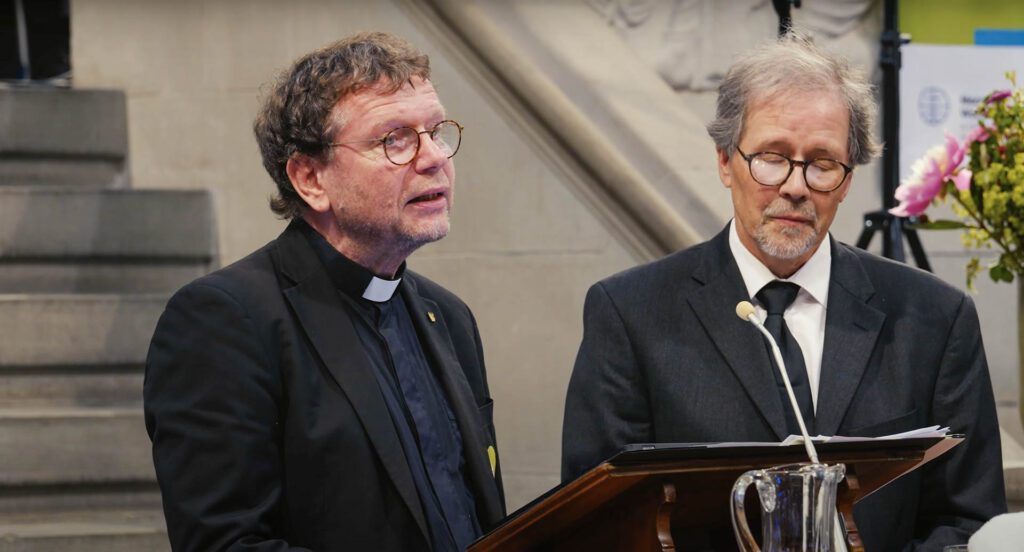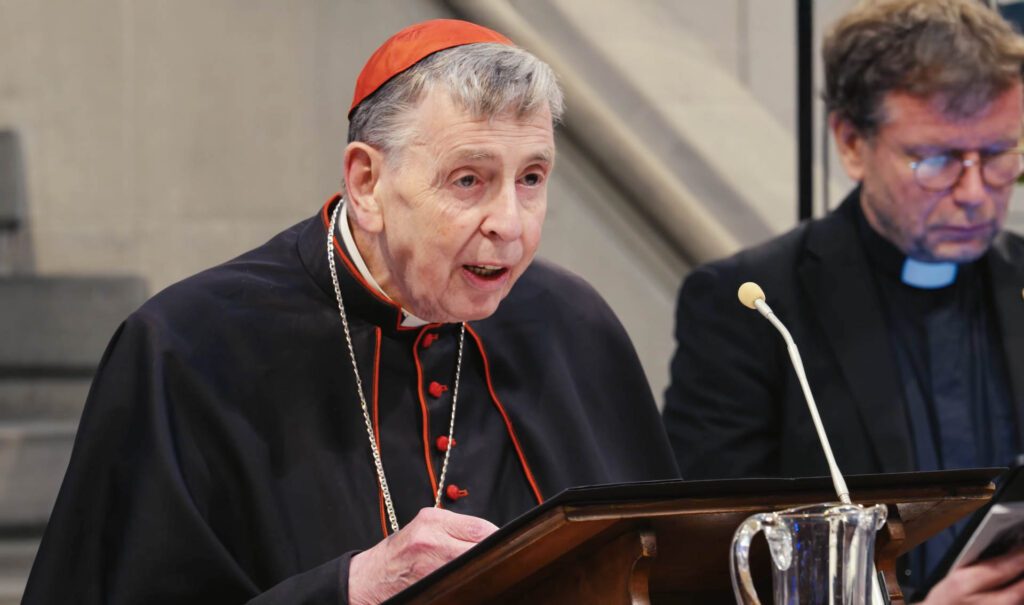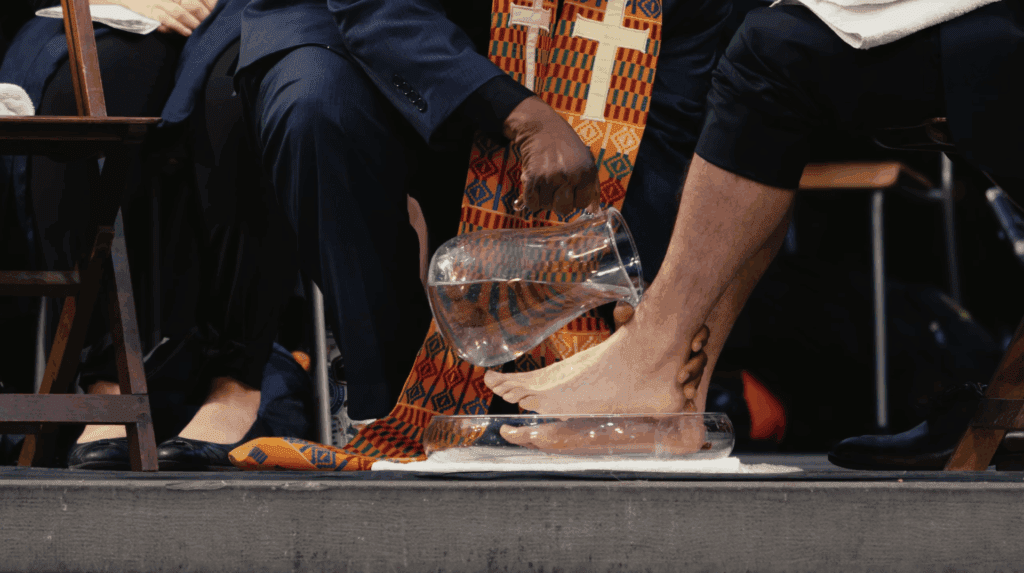The bells rang out across the city that full of Anabaptists. An estimated 3 500 or more people filled the streets of old Zurich on Ascension Day 29 May 2025 to commemorate the 500th anniversary of Anabaptism.
“Today, as Mennonites in Switzerland we are a small community,” said Gladys Geiser and Lukas Amstutz, co-presidents, Konferenz der Mennoniten der Schweiz, opening the worship service. The host city is the location of the first known adult baptisms of the Anabaptist movement. “But as we can see in this service, we are part of a movement that has become diverse and international.”
A celebration of reconciliation
All nations together
From its beginnings with a few courageous believers in Europe, now Mennonite World Conference has 111 member churches (after the Executive Committee meeting a few days earlier in Germany) in 61 countries around the globe.
“Today we can all gather here: all nations as it says in the Word – all nations, all tribes, all languages – together here. This is special because it’s only the Lord who could do things like this,” said Jean-Claude Ambeke, a Mennonite Brethren from Angola, currently living in France.
A slightly overcast morning turned into a sunny day for walking historic streets, cramming into lecture rooms or listening to choirs. Courtesy of the Reformed church, there was even a pop-up vendor giving out ice cream.
Participants could stretch their legs while following a historical walking tour or role-playing scenarios of a “story trail” while more than a dozen workshops offered perspectives on Anabaptism: testimonies, historical surveys and present-day issues. Additionally, Swiss theologian and journalist Judith Wipfler led a panel discussion with today’s Anabaptist leaders who live in areas of conflict and challenge reflecting on “a world on fire.”
Five choirs from around the world gave an indoor and outdoor concert and joined a mass choir for the worship service. They led Assembly favourites like “Ewe Thina” and “Kirisuto no heiwa ga.” A new song was introduced by Songs of Peace with a chorus calling “We want justice, we want peace!”
An important church
Line ups for the closing worship service began midafternoon. The 1 200-seat Grossmünster was full to capacity, as were the overflow venues (Predigerkirche 350, Friedenskiche 250, FEG 100 and ad hoc addition Helferei 130) – and still 100s were left outside, sitting in the plaza or scattered to cafés, watching on cellphone screens.
Meanwhile around the world, thousands tuned in online on personal screens or together with others at churches, offices (such as Everence and MCC) or museums (such as Mennonite Life and the Mennonite Heritage Village Museum).
With representatives from 13 global communions and three multilateral ecumenical organizations as honoured guests, the service was not only about Anabaptism but another step in the path of reconciliation.
A journey of reconciliation
“We all inherit a legacy of pain from Reformation divisions. We know that differences of theology and practice remain, but we rejoice in the journey of reconciliation that we have shared together,” said Janet Plenert in the worship liturgy.
View this liturgy
The service featured leaders from the Lutheran World Federation and World Communion of Reformed Churches (WCRC) and a message from Pope Leo XIV brought by Cardinal Kurt Koch, prefect of the Dicastery on Promoting Christian Unity. “I assure you of my prayers that our fraternal relations will deepen and grow,” the cardinal read.
While MWC’s John D. Roth and WCRC’s Hanns Lessing confessed their communion’s “common witness to the unity of the church,” general secretaries César García and Setri Nyomi washed each others’ feet in what J. Nelson Kraybill called “a tangible expression of our commitment to reconciliation.”
Another concrete expression of support was the use of Reformed church buildings – including the iconic Grossmünster at no charge.
“Meeting again in the Grossmünster 500 years after the division – now as a ‘reconciling family’ – created a powerful new moment in our collective memory that I hope will change the way the next generation tells our story,” said John D. Roth, Renewal events coordinator for MWC.
The event which was strategically framed as a commemoration thus closed on a note of celebration. Choirs from five regions formed a tunnel of song as guests exited the church to the notes of Siyahamba, “we are marching in the light of God.”
A celebration of reconciliation
- Opening prayer: Prayer of invocation
- Disruption: People of God
- Sermon: The Courage to Love
- Reconciliation liturgy: Our journey to reconciliation
- A litany for the healing of the nations
- The courage to love in a troubled world
Opening prayer: Prayer of invocation
Let us join our hearts in prayer.
Compassionate God, in a world divided by nationalism, religious conflict, xenophobia and war, you have brought us together today as people of many nations, languages and church bodies.
Your grace, O God, makes this gathering in love possible. Thank you for the overwhelming hospitality shown to Anabaptists by the city of Zurich and the Reformed churches of Switzerland. Bless such a generous expression of kindness!
Thank you for the witness of all here today who know and express your reconciling love. Even as the global church is sometimes divided, you summon us to live as sisters and brothers in Christ. Give us courage to love each other and the “other” – whoever that may be.
Pour out your Holy Spirit on us today so that your healing and love can flow through us to the world. Make us – and churches we represent – “one new humanity” united in love, “so that the world may know” that our hope is in Christ – in whose name we pray.
Amen.
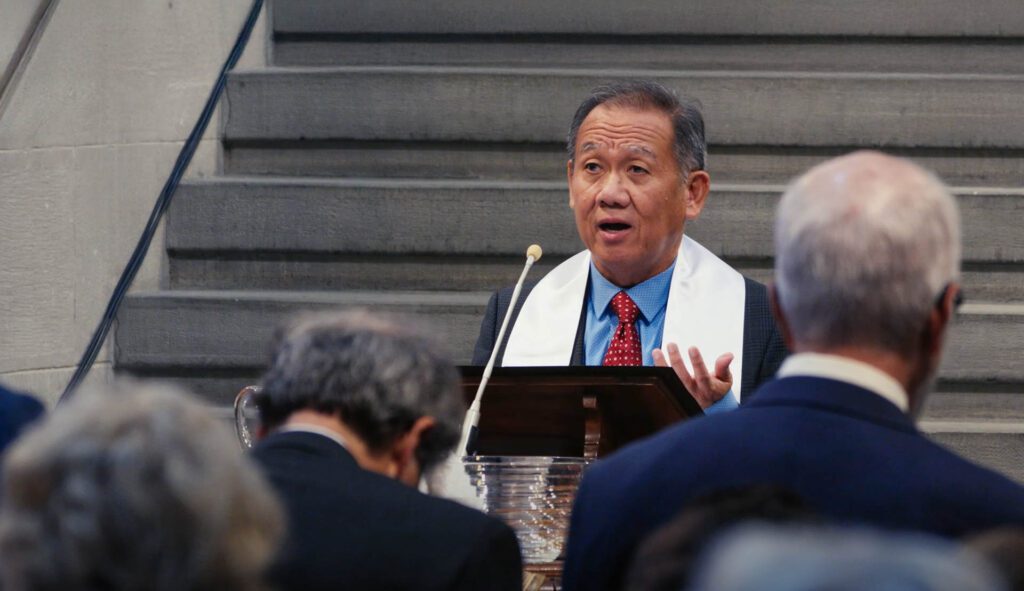
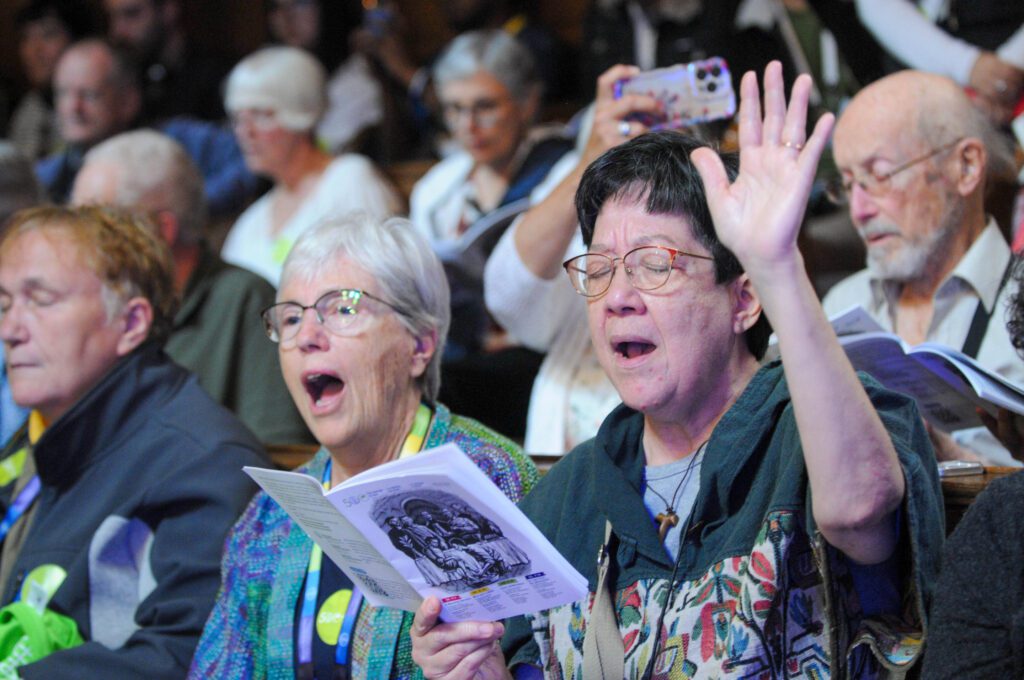
Disruption: People of God
A Church Disruption by Some People of God
Liturgist: People of God, we gather together in this historic city of Zurich, home of a 16th-century renewal movement led by Ulrich Zwingli, and the birthplace of that movement that we know today as Anabaptism.
[Hundreds of small paper flyers with messages on them flutter down from the balcony onto the people sitting in the pews and on the podium. Three demonstrators in period costume stand up and exclaim.]
First demonstrator: What kind of church is this?! Who really belongs in the body of Christ? Scripture calls the followers of Jesus to separate themselves from those who do not live a pure life!
Second demonstrator: Exclude those who do not baptize only upon confession of faith!
Third demonstrator: Exclude those in authority who do not let our congregations live quietly and in peace!
Liturgist: You are disturbing a worship service! Who are you? Why are you doing this?
First demonstrator: We are your Anabaptist forebears. Christ is our authority. Even he disturbed the peace!
Liturgist: Tell us more. We want to respect our traditions.
Second demonstrator: We have studied the Scriptures. God has given us a vision!
First demonstrator: Listen to us!
Third demonstrator: The kingdom of God is at hand!
First demonstrator: Blessed are those who hunger and thirst after righteousness!
Third demonstrator: To the rich we say, “Where your treasure is, there will your heart be also!”
Second demonstrator: To the powerful we say, “War is contrary to the will of God.” We will obey God rather than human authority!
Third demonstrator: Christ sides with those who have no helper – with refugees, victims of violence, those imprisoned for their faith and identity.
Liturgist: Wait… please! Listen to the Word of the Lord as spoken by the Apostle Paul:
Don’t think of yourself more highly than you ought to think…. God has measured out a portion of faith to each one of you. We have many parts in one body, but the parts don’t all have the same function.… Love each other like the members of your family. Be the best at showing honour to each other.
Confession and Lament
Liturgist: The congregation has been listening. Thank you for this reminder from our past.
We share your hope and we share your grievances. All who are assembled here today wish to be more like Jesus. All of us have sinned and fallen short of the glory of God. Let us pray for the grace to confess our sins and go out to live holy lives.
First demonstrator: Thank you for hearing us.
Liturgist: The waters of baptism have divided us.
[pouring water]
But those who drink from the healing water of Jesus, will never be thirsty again. Cleanse us Holy Spirit, refresh us with the water of eternal life.
We do not believe that Jesus died in vain. We do not believe that those who suffered for their faith through the ages did so in vain.
Second demonstrator: Yes! We needed to hear this from you. The words we speak must motivate us to action. That is why we have returned for this commemoration.
Liturgist: Let us pray. Almighty God, we come before you not because of our righteousness but because of your great mercy.
First demonstrator: Forgive us for the arrogance of thinking that we could be perfect and without sin.
Second demonstrator: Whether we live in communities set apart from the world or in the midst of the world, forgive us for being blind to the needs of our neighbours.
Third demonstrator: Forgive us for those times when we have failed to “do justice and love mercy.”
First demonstrator: Forgive us for our silence … for failing to give “the reason for the hope that is in us.”
Second demonstrator: Forgive us when we have refused to work with people different from us, even when the need was great.
Third demonstrator: Forgive us when we have looked down on other churches and missed opportunities to learn from and partner with them.
Thank you for those communities of faith who have opened their hearts to us and who walk together with us in the path of Jesus.
Liturgist: Receive our petitions, O Father, in the name of Jesus Christ, in the power of the Holy Spirit.
Together let us join in the prayer that Christ prayed, each in our own language.
“Our Father…”
Assurance of Forgiveness
Liturgist: Christ himself said, “Your sins are forgiven. Go and sin no more.” We are forgiven, loved, and free. Amen.
MWC vice president Lisa Carr-Pries (Canada) and former MWC president Danisa Ndlovu (Zimbabwe) lead this liturgy. Ebenezer Mondez (Philippines), James Jakob Fehr (Germany) and Ulrike Schmutz (Switzerland) played the roles of the disruptors.
Sermon: The Courage to Love
The Courage To Love
Reconciliation liturgy: Our journey to reconciliation
Leaders from the respective communions spoke these words. As Lutheran and Mennonite representatives spoke, they traced a cross on each other’s forehead. As the Reformed and Mennonite representatives spoke, the general secretaries washed each other’s feet.
Representatives
Representatives from Mennonite World Conference
- Anne-Cathy Graber, secretary for ecumenical relations
- J. Nelson Kraybill, former president
- Janet Plenert, former vice-president, current coordinator of regional representatives
- John Roth, chair, Renewal planning committee
- Larry Miller, former general secretary
Representative from the Catholic church
- Cardinal Kurt Koch, Prefect, Dicastery for the Promotion of Christian Unity
Representative from the Lutheran World Federation
- Rev. Anne Burghardt, general secretary
Representatives from the World Communion of Reformed Churches
- Rev. Dr. Hanns Lessing, executive secretary for communion and theology
- Rev. Dr. Setri Nyomi, interim general secretary
Mennonite
In our worship today, Mennonite World Conference along with representatives from other Anabaptist and Free Church traditions, gather alongside representatives of the Roman Catholic church, the Lutheran World Federation, and the World Communion of Reformed Churches to make a common witness.
We all inherit a legacy of pain from Reformation divisions. We know that differences of theology and practice remain, but we rejoice in the journey of reconciliation that we have shared together.
In 2003, Catholics and Mennonites concluded a five-year dialogue titled “Called Together to Be Peacemakers” which took as its starting point a shared recognition that “allegiance to Christ as Lord takes precedence over the demands of the state.”
More recently, Catholic and Lutheran participation in the Trilateral Dialogue on Baptism has helped to clarify points of convergence as well as ongoing differences around our understanding and practice of baptism. We regard these dialogues as a gift to the church.
Catholic
Message of the Holy Father Leo XIV
to the participants in the commemoration of 500 years of the Anabaptist movement
As you gather to commemorate 500 years of the Anabaptist movement, I cordially greet all of you, dear friends, in the first words spoken by the risen Jesus: “Peace be with you!” (John 20:19).
In the joy of our celebration of Easter, how can we fail to reflect on Christ’s appearance on the evening of that “first day of the week” (ibid.), when Jesus not only entered through walls and closed doors, but through the fearful hearts of his disciples. Moreover, in imparting his great gift of peace, Christ was sensitive to the experience of the disciples, his friends, and did not hide the marks of his Passion still visible in his glorious body.
By receiving the Lord’s peace, and accepting his call, which includes being open to the gifts of the Holy Spirit, all the followers of Jesus can immerse themselves in the radical newness of Christian faith and life. Indeed, such a desire for renewal characterizes the Anabaptist movement itself.
The motto chosen for your celebration, “The Courage to Love”, reminds us, above all, of the need for Catholics and Mennonites to make every effort to live out the commandment of love, the call to Christian unity, and the mandate to serve others. It likewise points to the need for honesty and kindness in reflecting on our common history, which includes painful wounds and narratives that affect Catholic-Mennonite relationships and perceptions up to the present day. How important, then, is that purification of memories and common re-reading of history that can enable us to heal past wounds and build a new future through the “courage to love”. What is more, only in such a way can theological and pastoral dialogue bear fruit, fruit that will last (cf. John 15:16).
This is certainly no easy task! Yet, it was precisely at particular moments of trial that Christ revealed the Father’s will: it was when challenged by the Pharisees that he taught us that the two greatest commandments are to love God and our neighbour (cf. Matthew 22:34-40).
It was on the eve of his Passion that he spoke of the need for unity, “that all may be one… so that the world may believe” (John 17:21). My wish for each of us, then, is that we can say with Saint Augustine:
“My entire hope is exclusively in your very great mercy. Grant what you command, and command what you will” (Confessions, X: 29, 40).
Finally, in the context of our war-torn world, our ongoing journey of healing, and of deepening fraternity, has a vital role to play, for the more united Christians are the more effective will be our witness to Christ the Prince of Peace in building up a civilization of loving encounter.
With these sentiments, I assure you of my prayers that our fraternal relations will deepen and grow. Upon all of you, I invoke the joy and serenity that come from the risen Lord.
From the Vatican 23 May 2025
Leo PP. XIV
Mennonite
In 2010, the Lutheran World Assembly, convening in Stuttgart, Germany, formally affirmed a “Mennonite Action,” based on the report of a five-year dialogue titled “Healing Memories: Reconciling in Christ.” A service of reconciliation included mutual expressions of forgiveness and a commitment to interpret Lutheran Confessions and Mennonite narratives of their past in light of the common history described in that report. That process marked a key moment in relations between our two communions and has laid the foundation for further learnings from each other on themes of baptism and the Christian relation to the state.
At the service of reconciliation in 2010, all of those present shared the sign of the cross as a way of making present to us the life, death and resurrection of Jesus Christ. The cross touches the wounds of sin, heals our brokenness and restores our lives. It promises healing through God’s grace and points to the gift of a new heart and a new spirit.
Today, the Mennonite World Conference and Lutheran World Federation remember and renew our commitment with the sign of the cross.
Lutheran
In the “Healing Memories” dialogue we committed ourselves to listening carefully to each other’s story and recounting the history of our shared beginnings in a way that both sides could affirm. The Lutheran conviction that God’s initiative makes our response in faith possible was warmly received by the Mennonites. The Lutheran appeal for forgiveness for having persecuted Anabaptists was freely granted. A shared and honest analysis of baptism helped to open the door to a fruitful Trilateral Dialogue on Baptism with Mennonite World Conference and the Catholic church.
We thank God that more and more Lutherans and Mennonites appreciate each other’s witness to the gospel.
Mennonite
Today in Zurich we celebrate the steps toward reconciliation that we have taken with representatives of the Reformed tradition.
In 2004, the city of Zurich and the Swiss Reformed church helped to erect a memorial plaque on the bank of the Limmat River acknowledging the execution of Felix Manz and six other Anabaptists in Zurich.
Three years later, the Swiss Mennonite Conference and the Reformed Church of the Canton of Zurich concluded a significant dialogue committing themselves to an ongoing journey of reconciliation. In that document, Mennonites affirmed that “We do not belong to ourselves. We belong to Jesus Christ, who calls us to follow him and has torn down the wall of enmity and united people near and far in one body.”
Last week the Mennonite World Conference General Council formally received a statement drafted with representatives of the World Communion of Reformed Churches titled “Restoring Our Family to Wholeness: Seeking a Common Witness.”
As we hear a litany of confession, gratitude, and commitment drawn from this statement, Mennonite World Conference general secretary César García and World Communion of Reformed Churches interim general secretary Setri Nyomi will wash each other’s feet as a tangible expression of our commitment to reconciliation. We invite all of you to bear witness to this sign of repentance and forgiveness.
Reformed
We have confessed the common origin of our churches and the pain of its fracturing. We ask God to bless the rediscovery of shared understandings of the gospel so that they might inspire evangelism and peacemaking.
Mennonite
In the presence of representatives of the whole church, the Mennonite World Conference and the World Communion of Reformed Churches make a common witness to the unity of the church.
Reformed
Today, we commemorate the common origins of our global communions, acknowledge our fractured relationship, and rejoice that, building on efforts over many years toward mutual understanding and reconciliation, we can respond to Christ our peace by living into the unity of the Spirit. Bound together, we pledge to be humble, patient, truthful and, above all, loving, as we walk together as one body of Christ.
Mennonite
Gathered under God’s loving gaze, we celebrate that our identity is found in our common confession of Jesus as Lord, our shared ancestors in the faith, and our common call to discipleship and gospel witness in a fragmented world.
Reformed
Our traditions have blessed us with a passion for justice and peace. May the God of the cross and the resurrection give us the heart and the mind to pursue peace and to practice the justice that resists violence, oppression, and ecological devastation, a justice that finds its fullest expression in forgiveness, mercy and reconciliation.
Mennonite
Today, as Anabaptist and Reformed members of Christ’s body, we affirm that our witness to the world is nourished and sustained by God’s grace, which enables us to love God, each other, and all creation.
Reformed
We commit ourselves to the sacred mission of proclaiming the gospel of love in all our contexts, each with their own challenges and demands. We will not let fear, mistrust, or obstacles to dialogue keep us from this calling.
Mennonite
We promise to journey together to heal the wounds of the past and to re-member the body of Christ. We pledge to learn from each other by sharing the richness and diversity of our traditions. We bind ourselves to purposeful cooperation that affirms God’s mercy and opens doors to the justice that leads to peace.
Reformed
Together, we pray for the body of Christ. In Christ, we are members of one another, brothers and sisters of the same flesh and the same Spirit.
Mennonite
Together, we embrace the gift of unity in the belief that you, O God, are restoring your family to wholeness. Amen.
Confessing our Faith Together
In recognition of our shared identity within the body of Christ, the participants stood together and recited – each in their own language – the Nicene Creed. This ancient statement of Christian faith arising from the Ecumenical Council of Nicaea marks its 1700th anniversary this year.
A litany for the healing of the nations
The litany was punctuated with water pouring from a basin as a reminder of baptism and brief organ music.
Today we have gathered for worship in the city where the first Anabaptists were inspired by the teachings of Ulrich Zwingli … and by the waters of the Limmat River where Felix Manz, the first Anabaptist martyr, was executed.
[Water pours]
God of love, we remember Felix Manz and followers of the Lamb in all times and places who have suffered faithful discipleship.
A loud voice cries from the throne of God, “I am making all things new.. . To the thirsty I will give water as a gift from the spring of the water of life.” (Revelation 21:5, 6)
[Water pours]
Loving God, with a world torn by war and a global church too often divided, how we thirst for you to make all things new! Come, Lord Jesus!
[organ interlude]
“[An] angel showed me the river of the water of life, bright as crystal, flowing from the throne of God and of the Lamb through the middle of the street of the city. On either side of the river is the tree of life with its twelve kinds of fruit, producing its fruit each month; and the leaves of the tree are for the healing of the nations.” (Revelation 22:1–2)
“In painful awareness that our differences became a source of conflict and division, we now pray for the courage and the creativity to reshape them in ways that enrich our unity in the body of Christ.”
[Water pours]
For the healing of the nations! For the healing of the church! “In Christ we are members of one another, brothers and sisters of the same flesh and the same Spirit…”
Healing God, the river of the water of life has reached us. Leaves of the tree of life have brought healing between church communions represented here today.
[organ interlude]
“‘It is I, Jesus, who sent my angel to you with this testimony for the churches. I am the root and the descendant of David, the bright morning star.’
The Spirit and the bride say, ‘Come.’
And let everyone who hears say, ‘Come.’
And let everyone who is thirsty come.
Let anyone who wishes, take the water of life as a gift.” (Revelation 22:16-17)
The courage to love in a troubled world
O God, our help in ages past, our hope for years to come:
Through the Holy Spirit’s work within us we have renewed hope as we see signs of healing and unity in the global church.
We have hope as we see vitality in churches represented here today that are geographically distant from denominational roots in Europe.
We have hope as we see evangelism and peacemaking working together at many places around the world.
Most of all, we have hope because in Christ you have promised that you will go with us “always, to the end of the age.”
Come, Holy Spirit, inspire us with the faithfulness of saints through the ages. Like them, let us never be ashamed of the gospel. Lord Jesus Christ, bless us with courage to risk loving each other, our neighbours, and even our enemies as you have loved us.
Amen.
